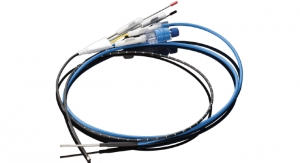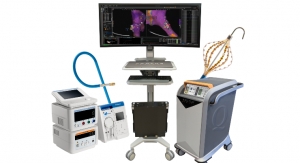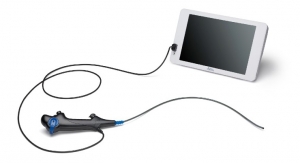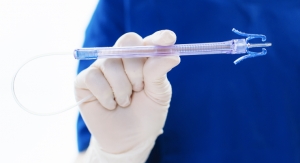Videos
RIOCATH, A Revolutionary Type of Catheter Inspired by a Snail's Eye
RIOCATH, A Revolutionary Type of Catheter Inspired by a Snail's Eye
The RIOCATH (Reversal Inside-Out CATHeterization) design greatly reduces the risk of introducing infection into the body.
By IOCB Prague05.29.18
The Czech company Riocath Global developed and patented in collaboration with the Institute of Organic Chemistry and Biochemistry of the Czech Academy of Sciences (IOCB Prague) a world-wide unique technology applicable to tubular medical devices. One of the first clinically significant applications is a new form of urinary catheter. The RIOCATH (Reversal Inside-Out CATHeterization) design greatly reduces the risk of introducing infection into the body as well as the trauma of sensitive tissues. So far, private investors have invested more than two million euros in the development. Clinical trials will begin by the end of this year and the first product market entry is expected in 2019.
Every day, various types of catheters, probes, tracheal tubes and drains are used by millions of patients around the world, protecting their health and in many cases saving their lives. However, application of tubular devices is also associated with certain risks, such as infection, as well as with considerable discomfort and pain for the patient. Insertion in the human body and use of such device often results in irritation or even damage to soft tissues or mucous membranes and subsequent scarring of the tissue. Another danger resulting from the use of current catheters is the introduction of infection into the patient's body that cannot be fully prevented even if the best sterilization techniques are used. The reason is that as the catheter makes its way through the urethra into the bladder it carries on its surface the microbes from the urethra's tip. Infection then easily spreads into the kidneys and can even be carried by blood to other parts of the body.
"Application of double-skinned RIOCATH catheters will revolutionize patient care in many health care fields. The unique patented mechanism can significantly reduce the risk of infection and damage to tissues in comparison to existing medical devices and makes for a safer and more comfortable use. Unlike old catheters whose casing rubs on the urethra's wall during its insertion, the new technology allows for the catheter to extend by unfolding itself from the inside out, virtually imitating a snail's eye stalk," explained Miroslav Svoboda, M.D., the project initiator, co-inventor and CEO of Riocath Global.
The new type of RIOCATH urinary catheter will be of great benefit to a broad spectrum of patients. A significant reduction in the number of infections, mainly of the urinary tract, should contribute significantly to reducing the need for antibiotic treatment. All this will lead to a better, more comfortable patient care and to significant savings in the health care system.
The Riocath Global team has been cooperating with the IOCB Prague and its Development Center since the beginning of the project in 2013. "Dr. Svoboda came up with a revolutionary technical solution and was searching for an institution capable of assisting with the development of a functional prototype," said Prof. Martin Fusek, IOCB Prague Deputy Director. "Although this is not a typical field for the IOCB Prague, our Development Center could provide expertise and was able to help him. We're very pleased that the Institute can assist with such a remarkable invention that has the potential to protect hundreds of thousands of patients from unnecessary infections and other health complications."
The RIOCATH project has raised more than two million euros from private investors. "Upon completion of clinical trials and marketing of the catheter, the estimated value of the company will grow to tens of millions of euros. Apart from urinary catheters, the principle can be used in a number of other applications which are part of the company's development portfolio, in most cases with considerable market and therapeutic potential," commented on the importance of the patented technology Jaromír Zahrádka, Ph.D., a member of the Board of directors of Riocath Global responsible for the intellectual property protection, and the CEO of the i&i Prague, a biotech incubator founded at IOCB Prague. "RIOCATH's technical solution is a unique one worldwide as was confirmed by a comprehensive search by the European Patent Office after the application was first filed. So RIOCATH's principle and use will most likely have adequate patent protection throughout the world," concluded Jaromír Zahrádka.
During the development of the new type of catheter, a wide range of concepts had been designed and tested at the IOCB Development Center before the final prototype was created. "When you pull back an ordinary latex or silicone tube to make a double layer, you can't pull the outer layer on for more than a few centimeters because of clamping forces and friction. RIOCATH is unique because of the catheter's dynamic character which allows for the layers to move smoothly on one another when the catheter's tip extends," explains co-author of the invention Ing. Vít Pokorný from IOCB Development Center. "Thanks to the excellent collaboration with the Centre of Polymer Systems at Tomas Bata University in Zlín and the contribution of Compuplast and several other partners, we were able to create several concepts of the catheter prototype with different forms of active profile and to choose the optimal solution for the urinary catheter," added Vít Pokorný.
The RIOCATH solution was already presented to the Czech Society of Hospital Epidemiology and Hygiene and impressed its experts. "The RIOCATH mechanism has a potential to significantly reduce the incidence of catheterization-related infections in hospitals. If clinical tests demonstrate the properties of these products, as shown by preclinical tests so far, this will be undoubtedly a revolutionary step in catheterization. It will enable health professionals to make catheterization more patient-friendly and to more effectively prevent the risk of infections. The potential extension of RIOCATH technology will be of benefit to patients," expressed the opinion of hospital hygienists and epidemiologists Pavel Totušek, M.D., Chairman of the Czech Society of Epidemiology and Hygiene.
Related Searches:



























